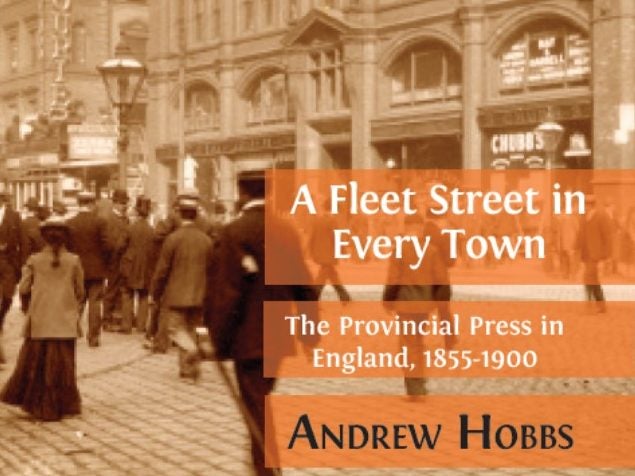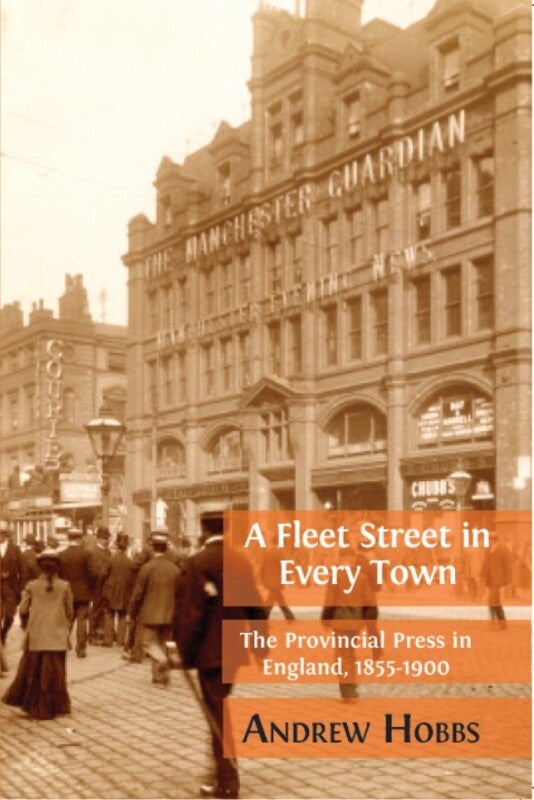
Local newspapers were one part of the social revolution stimulated by the swift spread of literacy in the 19th century – when children became the experts, better able to use the technology of print than their parents.
In the mid-nineteenth century, when taxes made newspapers very expensive, reading the local paper was usually a communal activity.
A Lancashire mill worker on a typical wage of fifteen shillings a week could earn a penny in 20 minutes, taking just over an hour to earn 3½d, the price of a local paper or two pints of beer.
In every city, town and even village there were places dedicated to reading newspapers, called reading rooms or news rooms (not to be confused with our present-day meaning of an editorial office).
Most pubs probably provided at least one newspaper for their customers.
Publicans saw newspapers as an attraction worth advertising in their windows, even setting aside valuable space for their reading, as with the “reading room” of the Boar’s Head Inn in Friargate, Preston or the “news room” of Blackburn’s Alexandra Hotel, whose landlord even advertised the titles of the papers available, most of them regional or local.
Pubs were attractive, cheap and accessible reading places for working-class people – warm, well-lit, with reading material sympathetic to their interests, unpoliced by middle-class reformers or evangelists, allowing free discussion, in a convivial atmosphere fuelled by alcohol.
In Clitheroe, Lancashire, for example, weaver John O’Neil could obtain a newspaper to read at home, but he preferred to walk a mile into town to read the news in the Castle Inn every Saturday night.
However, it was impossible to read the paper if the pub was too busy or noisy, as during Clitheroe’s fair, when the town was “throng” with people. In 1857 O’Neil wrote in his diary: “I had a few glasses of ale but Public Houses was so throng and so noisy I could not read the newspaper.”
Neither could he read if he drank too much, as on New Year’s Day 1859: “I went up to Clitheroe and got my Christmas glass. It was the best whiskey I ever got in my life, it nearly made me drunk. It made me so that I could not read the newspaper, so I had to come home without any news.”
“Ask the landlord why he takes the newspaper. He’ll tell you that it attracts people to his house, and in many cases its attractions are much stronger than those of the liquor there to be drunk,” reformer William Cobbett claimed in 1807.
In Preston, according to local historian William Pilkington, reading the paper aloud and discussing its contents had been a formalised event during the excitement of the 1830 election, at which the radical Henry Hunt defeated Lord Stanley:
“They flocked to the public-house on a Sunday evening as regularly as if it had been a place of worship, not for the set purpose of getting drunk, but to hear the newspaper read.
“The success of the landlord depended, not on the strength of his beer altogether, but on having a good reader for his paper […] it was not the general custom to drink during the reading of the paper.
“Every one was expected to drink during the discussion of any topic, or pay before leaving for the good of the house.”
These skilled public readers brought the newspaper alive in crowded pubs. One Liverpool pub landlord, John McArdle, performed the paper himself, creating a very different experience from reading silently and alone.
Irish nationalists came to his pub in Crosbie Street every Sunday night to hear him read the nationalist paper the Nation (which cost sixpence in the 1840s).
Journalist John Denvir recalled: “McArdle was a big, imposing looking man, with a voice to match, who gave the speeches of O’Connell and the other orators of Conciliation Hall with such effect that the applause was always given exactly in the right places, and with as much heartiness as if greeting the original speakers.”
The rhythms of reading the newspaper
There were daily, weekly and annual rhythms to newspaper-reading in the nineteenth century. Regional morning newspapers such as the Liverpool Daily Post or the Bristol Mercury were available to most readers in England hours before the London papers arrived by train.
From the 1880s, when halfpenny provincial evening papers appeared, these were linked to the end of the working day, sold at factory gates and read at home in front of the fire.
Weeklies were usually published on the local market day, fitting into older routines and economies. Newspaper-reading went up in the winter, down in the summer.
Wars, elections and other newsworthy events created less regular or predictable times when reading, particularly reading of news, became more important.
These stories, along with election or sporting results, attracted crowds to the newspaper offices, to read the telegrams and posters stuck on the windows or shutters, and to buy ad hoc supplements with verbatim reports of election speeches or special editions, the Victorian version of “rolling news”.
During wartime
War has always been good for the news trade. Wars prompted the creation of reading institutions, such as the Lord Street Working Men’s Reading Room in Carlisle, which began when 50 men, “anxious to read about the European revolutions of 1848, clubbed together to buy newspapers”.
A few years later the Crimean War motivated Hebden Bridge men to join a society in order to read the papers.
The Clitheroe weaver John O’Neil counted the days until he could hear more news of the Indian Mutiny in 1857, writing of how he “heard today that Delhi has been taken but I could learn no particulars, so I must wait until Saturday when I will see the newspaper”.
He was gripped by reports of the battle that ended the second War of Italian Independence in 1859; on 2 July he “got a newspaper and read the full account of the great battle of Solferino, fought on 24 June”.
The next day, he wrote: “I have never been out of the house. I have been reading nearly all day different accounts of the great battle of Solferino.”
Publishers large and small responded to this intense, avid reading of war news, such as the unemployed compositor described in the Press News (a forerunner of UKPG) in 1868, who compiled telegrams of the Ethiopian revolt and sold 10,000 copies of his “Abyssinian Gazette Extraordinary, at a profit to him, personally, of not less than £12”.
The Franco-Prussian War of 1870-71 was the first “European war on a grand scale since the recent development of the cheap press and telegraphy”, as the Printers’ Register noted, stimulating accelerated demand for war news among the mainly middle-class buyers of morning newspapers:
Families which would a few years back expend a shilling in the course of a week will now spend three; and men who were content with their favourite morning paper formerly, must now indulge themselves with an evening paper as well, and occasionally with a second or third edition.
A week later another trade paper reported that “the war has been the means of increasing the sale of newspapers immensely, both London and Provincial”.
In Preston, too, the demand for news had an impact. The Preston Guardian boasted how “a large crowd gathered on our special edition being published” to report the surrender of Emperor Napoleon III, causing “great excitement in Preston”.
In 1870-71, a gentleman’s club in Preston spent forty per cent more on newspapers than the year before, probably due to the purchase of more titles and more editions to meet demand for war news.
Even second-hand newspapers were in greater demand in 1870 – at the same club’s annual auction of second-hand papers and magazines that year, the resale value of newspapers such as the Preston Chronicle, Liverpool Mercury and Manchester Guardian rose, while those for magazines fell.
A Fleet Street in Every Town: The Provincial Press in England, 1855-1900 is out now published by Open Book Publishers.
Dr Andrew Hobbs is course leader for BA (Hons) International Journalism at the University of Central Lancashire.

A Fleet Street in Every Town: The Provincial Press in England, 1855-1900 by Andrew Hobbs
Email pged@pressgazette.co.uk to point out mistakes, provide story tips or send in a letter for publication on our "Letters Page" blog






